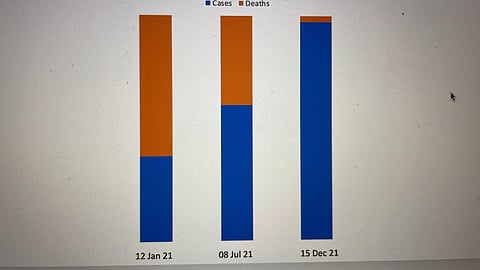The number of deaths due to Covid-19 in South Africa is in conformity with various reports and studies which suggest that the new variant Omicron is highly infectious but less life-threatening.
Omicron Variant Is Infectious But Not Life-Threatening, Shows Data
South Africa is witnessing its fourth wave of Covid-19 infections which is largely being seen due to the Omicron variant. While comparing the three recent waves, it can be clearly seen that the severity due to this variant is much lower than either Beta or Delta variants.
Though Omicron was detected in South Africa early, it was reported to World Health Organisation (WHO) on November 24.
The weekly average death from November 24 onwards up to December 16 doesn’t show any significant variation. Normally, in the majority of cases, it takes almost seven to ten days for a Covid-19 patient to develop severe symptoms for hospitalisation and death.
The seven-day average of death numbers on November 30 was 21 and a week later on December 7, it slightly went up to 23. One week after that on December 14, it was reported to be 24.
South Africa is witnessing its fourth wave of infections which is largely being seen due to the Omicron variant. The previous waves were contributed to other variants such as Alpha, Beta and Delta. The first wave was not so significant as it was small compared to the next three waves.
While comparing the three recent waves – second, third and fourth - it clearly suggests that the severity due to this variant is much lower than either Beta or Delta variants.

During the second wave, which was largely contributed by the Beta variant, South Africa had the highest 7-day average infection on January 12, 2021, with 18,856 active cases. The 7-day average death on that day was 544.
The third wave, predominantly caused by the Delta variant, saw the highest 7-day average on July 8 with 19956 cases while a 7-day average of death on that day was 363.
Now, the current wave, the fourth one, has reported the highest 7-day average on December 15 with 22852 cases, however, the 7-day-average death number on that day has fortunately been as low as 27only.
“The ratio of death and number of cases has reduced several-fold during the current wave in South Africa. If this wave is largely due to Omicron, it clearly suggests that the severity due to this variant is much lower than either Beta or Delta variants,” Gyaneshwar Chaubey, a professor of genetics at Banaras Hindu University (BHU), said.
It is perhaps due to these reasons that the national coronavirus command council (NCCC) of South Africa has decided on December 16 to have lockdown restrictions at level 1 only despite the holiday seasons and festivals ahead.
The latest study, by a team of researchers from the University of Hong Kong, has found that though Omicron develops 70 times faster in bronchial tissue, it replicates 10 times slower than the original Sars_Cov_2 in lung tissues. The study says that this could be an indicator of lower disease severity.
The average death numbers even in other countries where the new variant was detected almost three weeks ago don’t show any alarming trend so far.
For instance, the Netherlands detected two cases between November 19 and 23 and it has been more than three weeks since the new variant is present in the country, despite that both average infection and death don’t have any worrying pattern.
Even in Botswana, where the new variant was reported to be found on November 9, the number of infections has gone up several times in but death numbers haven’t increased in that proportion at all.
Dr Amitav Banerjee, Head, Department of Community Medicine, Dr DY Patil Medical College Pune says that the reports suggest that the Omicron is more infectious and less virulent and this is on the expected line.
A clinnial epidemiologist with over 20 years of experience in the Armed Forces, Dr Banerjee says that viruses follow Nature’s Law of adaptation, which we also call Darwin’s Law. He says that viruses mutate to adapt themselves so that they can survive.
“Leading and virulent strain perish with the victim leading to a dead-end infection. Less virulent types cause symptom and they too don’t survive for very long as the patient resort to self-isolation. So, only that mutant which is the least virulent ones which cause only mild symptoms will survive,” Dr Banerjee said.
He added, “The new mutant, according to the available data and report, is so far supporting Darwin’s law of natural selection perfectly. It is causing very mild and self-limiting symptoms.
A Data scientist associated with a government institution says, requesting anonymity, “Even if the death numbers will slightly rise in South Africa, it still does not sound an alarm bell for the rest of the countries because South Africa has the fourth-highest HIV/AIDS prevalence rate with about 19% of the population testing positive for it. It means It has a significant percentage of people who are immuno-compromised among whom death rate is always high.”